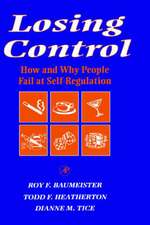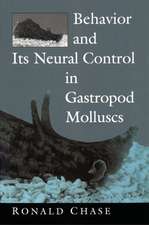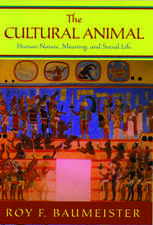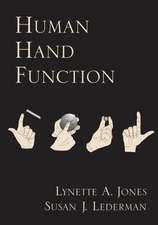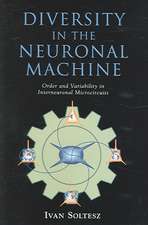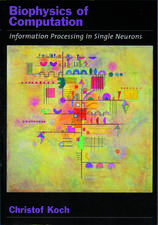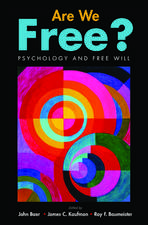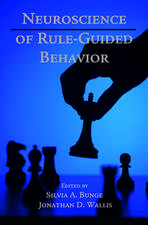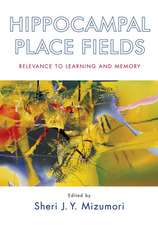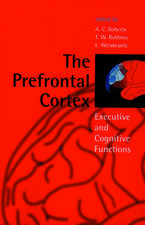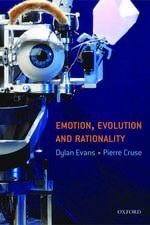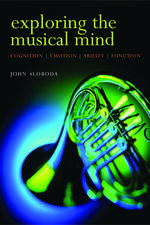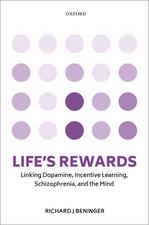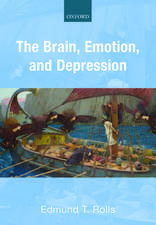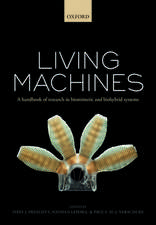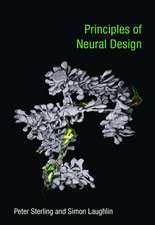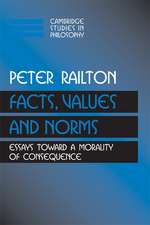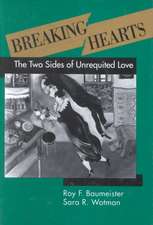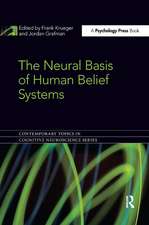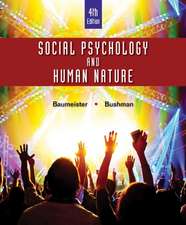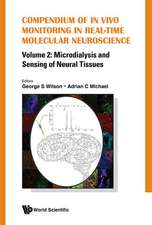Homo Prospectus
Autor Martin E. P. Seligman, Peter Railton, Roy F. Baumeister, Chandra Sripadaen Limba Engleză Hardback – 4 aug 2016
Preț: 453.77 lei
Nou
Puncte Express: 681
Preț estimativ în valută:
86.84€ • 90.33$ • 71.69£
86.84€ • 90.33$ • 71.69£
Carte disponibilă
Livrare economică 24 martie-07 aprilie
Preluare comenzi: 021 569.72.76
Specificații
ISBN-13: 9780199374472
ISBN-10: 0199374473
Pagini: 400
Ilustrații: 2
Dimensiuni: 160 x 239 x 36 mm
Greutate: 0.66 kg
Editura: Oxford University Press
Colecția OUP USA
Locul publicării:New York, United States
ISBN-10: 0199374473
Pagini: 400
Ilustrații: 2
Dimensiuni: 160 x 239 x 36 mm
Greutate: 0.66 kg
Editura: Oxford University Press
Colecția OUP USA
Locul publicării:New York, United States
Recenzii
An important insight about how the mind works, presented with a slew of fascinating discoveries and a refreshingly interdisciplinary approach.
Homo Prospectus is a groundbreaking book that capitalizes on 21st-century fMRI studies and user-friendly philosophy to create a paradigm shift that may make the book the most influential psychological text since Skinner's Science and Human Behavior. The concept of prospection developed in Homo Prospectus, of being drawn by the future, instead of-as both Freud and Skinner would have it-being driven by the past, reflects a true paradigm shift not only for academics and clinicians, but for the general reader.
One of the greatest satisfactions in the life of the mind is learning something that feels deeply true, even familiar, that we never actually thought before, when a book articulates intuitions that we never quite knew we had. Homo Prospectus does just this. . . . The authors are eminent philosophers and psychologists who write beautifully. The book convincingly demonstrates that fast intuitive thinking is in fact comprehensive, complex, and well-informed, and applies this insight to domains ranging from morality to successful aging.
One of the most interesting chapters in the book is on Creativity and Aging with guest appearances by Marie Forgeard and Scott Barry Kaufman...this chapter points to the evolutionary benefits of creativity throughout our lifespan, establishing economic security and driving innovation to create a better life for our offspring. The human race has advanced by our ability to hand down innovations from one generation to the next, based on our imagined prospection of their future needs.
Homo Prospectus is a groundbreaking book that capitalizes on 21st-century fMRI studies and user-friendly philosophy to create a paradigm shift that may make the book the most influential psychological text since Skinner's Science and Human Behavior. The concept of prospection developed in Homo Prospectus, of being drawn by the future, instead of-as both Freud and Skinner would have it-being driven by the past, reflects a true paradigm shift not only for academics and clinicians, but for the general reader.
One of the greatest satisfactions in the life of the mind is learning something that feels deeply true, even familiar, that we never actually thought before, when a book articulates intuitions that we never quite knew we had. Homo Prospectus does just this. . . . The authors are eminent philosophers and psychologists who write beautifully. The book convincingly demonstrates that fast intuitive thinking is in fact comprehensive, complex, and well-informed, and applies this insight to domains ranging from morality to successful aging.
One of the most interesting chapters in the book is on Creativity and Aging with guest appearances by Marie Forgeard and Scott Barry Kaufman...this chapter points to the evolutionary benefits of creativity throughout our lifespan, establishing economic security and driving innovation to create a better life for our offspring. The human race has advanced by our ability to hand down innovations from one generation to the next, based on our imagined prospection of their future needs.
Notă biografică
Martin E. P. Seligman, PhD, Director of the Penn Positive Psychology Center, Zellerbach Family Professor of Psychology in the Penn Department of Psychology, and Director of the Penn Master of Applied Positive Psychology program (MAPP). Seligman is a leading authority in the fields of Positive Psychology, resilience, learned helplessness, depression, optimism and pessimism. He has written more than 275 scholarly publications and 25 books, including Flourish: A Visionary New Understanding of Happiness and Well-being (2011) and co-authored Character Strengths and Virtues: A Handbook and Classification (Oxford University Press 2004).Peter Railton, PhD, is Gregory S. Kavka Distinguished University Professor of Philosophy at University of Michigan, Ann Arbor. Railton has worked in the philosophy of science, ethics, metaethics, political philosophy, and aesthetics. He has also taught at Berkeley and Princeton and been affiliated with various research centers in the US and Europe.Roy F. Baumeister, PhD, is Frances Eppes Eminent Scholar and Professor of Psychology at Florida State University. Baumeister's research spans self and identity, self-regulation, interpersonal rejection and the need to belong, sexuality and gender, aggression, self-esteem, meaning, and self-presentation. He has written over 500 publications and 31 books, including Willpower: Rediscovering the Greatest Human Strength (2011) and The Cultural Animal: Human Nature, Meaning, and Social Life (Oxford University Press 2005).Chandra Sripada, MD, PhD, is Associate Professor of Philosophy and Psychiatry at University of Michigan, Ann Arbor. Sripada studies brain mechanisms of decision-making, prospection, and self-control, and tries to understand how emerging results from the sciences impact our picture of ourselves as free and rational agents.

